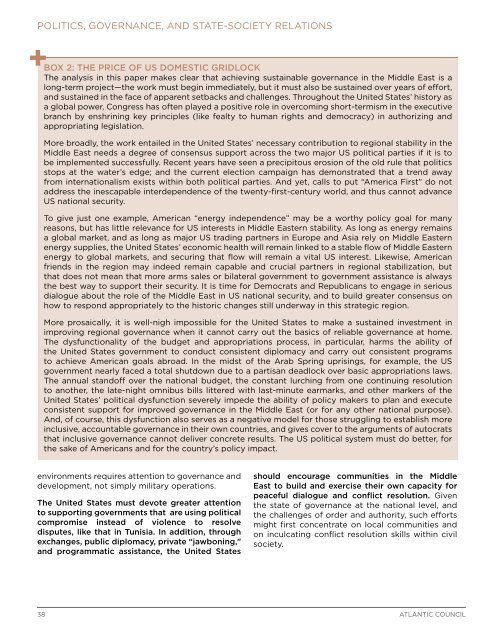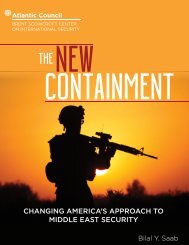POLITICS GOVERNANCE STATE-SOCIETY RELATIONS
Politics_Governance_and_State-Society_Relations_web_1121
Politics_Governance_and_State-Society_Relations_web_1121
Create successful ePaper yourself
Turn your PDF publications into a flip-book with our unique Google optimized e-Paper software.
<strong>POLITICS</strong>, <strong>GOVERNANCE</strong>, AND <strong>STATE</strong>-<strong>SOCIETY</strong> <strong>RELATIONS</strong><br />
+<br />
BOX 2: THE PRICE OF US DOMESTIC GRIDLOCK<br />
The analysis in this paper makes clear that achieving sustainable governance in the Middle East is a<br />
long-term project—the work must begin immediately, but it must also be sustained over years of effort,<br />
and sustained in the face of apparent setbacks and challenges. Throughout the United States’ history as<br />
a global power, Congress has often played a positive role in overcoming short-termism in the executive<br />
branch by enshrining key principles (like fealty to human rights and democracy) in authorizing and<br />
appropriating legislation.<br />
More broadly, the work entailed in the United States’ necessary contribution to regional stability in the<br />
Middle East needs a degree of consensus support across the two major US political parties if it is to<br />
be implemented successfully. Recent years have seen a precipitous erosion of the old rule that politics<br />
stops at the water’s edge; and the current election campaign has demonstrated that a trend away<br />
from internationalism exists within both political parties. And yet, calls to put “America First” do not<br />
address the inescapable interdependence of the twenty-first-century world, and thus cannot advance<br />
US national security.<br />
To give just one example, American “energy independence” may be a worthy policy goal for many<br />
reasons, but has little relevance for US interests in Middle Eastern stability. As long as energy remains<br />
a global market, and as long as major US trading partners in Europe and Asia rely on Middle Eastern<br />
energy supplies, the United States’ economic health will remain linked to a stable flow of Middle Eastern<br />
energy to global markets, and securing that flow will remain a vital US interest. Likewise, American<br />
friends in the region may indeed remain capable and crucial partners in regional stabilization, but<br />
that does not mean that more arms sales or bilateral government to government assistance is always<br />
the best way to support their security. It is time for Democrats and Republicans to engage in serious<br />
dialogue about the role of the Middle East in US national security, and to build greater consensus on<br />
how to respond appropriately to the historic changes still underway in this strategic region.<br />
More prosaically, it is well-nigh impossible for the United States to make a sustained investment in<br />
improving regional governance when it cannot carry out the basics of reliable governance at home.<br />
The dysfunctionality of the budget and appropriations process, in particular, harms the ability of<br />
the United States government to conduct consistent diplomacy and carry out consistent programs<br />
to achieve American goals abroad. In the midst of the Arab Spring uprisings, for example, the US<br />
government nearly faced a total shutdown due to a partisan deadlock over basic appropriations laws.<br />
The annual standoff over the national budget, the constant lurching from one continuing resolution<br />
to another, the late-night omnibus bills littered with last-minute earmarks, and other markers of the<br />
United States’ political dysfunction severely impede the ability of policy makers to plan and execute<br />
consistent support for improved governance in the Middle East (or for any other national purpose).<br />
And, of course, this dysfunction also serves as a negative model for those struggling to establish more<br />
inclusive, accountable governance in their own countries, and gives cover to the arguments of autocrats<br />
that inclusive governance cannot deliver concrete results. The US political system must do better, for<br />
the sake of Americans and for the country’s policy impact.<br />
environments requires attention to governance and<br />
development, not simply military operations.<br />
The United States must devote greater attention<br />
to supporting governments that are using political<br />
compromise instead of violence to resolve<br />
disputes, like that in Tunisia. In addition, through<br />
exchanges, public diplomacy, private “jawboning,”<br />
and programmatic assistance, the United States<br />
should encourage communities in the Middle<br />
East to build and exercise their own capacity for<br />
peaceful dialogue and conflict resolution. Given<br />
the state of governance at the national level, and<br />
the challenges of order and authority, such efforts<br />
might first concentrate on local communities and<br />
on inculcating conflict resolution skills within civil<br />
society.<br />
38 ATLANTIC COUNCIL



